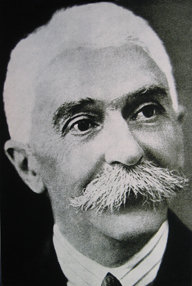He started the Olympic fairytale
Pierre Frédy, Baron de Coubertin was born in Paris in 1863. He is considered the founder of the modern Olympic Games.
He came from a wealthy, aristocratic family and grew up in a time characterized by political and social unrest. France lost the Franco-German war of 1870-71, and new social classes challenged the established rulers. Coubertin was keen to change the French education system. He took ideals from the English boarding schools where sport was central, and sports competitions were considered an excellent tool for moral education. He agreed with Montaigne that "to strengthen the brain, one must first strengthen the muscles". Coubertin himself was an active sportsman and practiced boxing, fencing, horse riding and rowing!” The excavations of the old facility in Olympia in 1875 – 1881, carried out by German archaeologists, piqued Coubertin's interest. He had studied Greek literature and was fascinated by the Olympic Games. He began toying with the idea of France bringing the Olympic Games to life. The idea was first presented publicly in a meeting of the French Sports Federation in the autumn of 1892.
On 23 June 1894, he gathered prominent sports figures in Paris to discuss the matter. 79 representatives from 12 nations participated, and a decision was made to resume the Olympic Games. The date is therefore seen as the founding date of the Comité International Olympique or the International Olympic Committee (IOC). The first president of the IOC was Demetrius Vikelas from Greece. In 1896, Pierre de Coubertin took over the role of president and led the IOC for 29 years until the Congress in Prague in 1925. He was then appointed honorary president of the IOC for life, the only one in history.
Coubertin retired from the IOC in 1925 to work on his "unfinished symphony", which he called his educational work. At the age of 69, in 1931 he published his "Olympic Memoirs", which include his intellectual and philosophical reflections. Pierre Frédy, Baron de Coubertin died suddenly of a heart attack on 2 September 1937 in a park in Geneva. He was buried in Lausanne, but at his own request his heart was cut out and taken to Olympia. There it was cast into a memorial boat. In line with this, it is Lausanne that manages the organization IOC and the flow of money, while it is Olympia that takes care of the ideological heritage through the International Olympic Academy.
